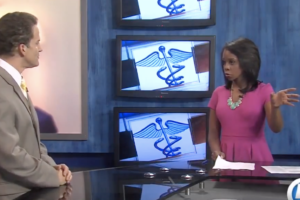Speaker 1: Monday the World Health Organization declared Zika a global emergency, meaning the virus is now considered as dangerous as Ebola, the outbreak that we saw last year. And there are confirmed cases in the United States of people who have traveled to South America and the Caribbean. So, the question is should you be worried? Here’s Channel 5’s medical expert Dr. David Soria, joins us now with more on this.
Nice to have you with us. We seem to be talking about this more and more on a regular basis. And Zika has been around, I mean why is it suddenly in the news every day?
Dr. David Soria: Yeah I think probably the main reason is that now we’re seeing it migrate to more developed countries, and there may have been a mutation in the virus that’s made it more prevalent, and so we’re just seeing it in higher volume. But you’re right, it has been around for a while.
Speaker 1: Can it be treated?
Dr. David Soria: Well it cannot. Like most viruses unfortunately it has to run its course, but the good news is that really truly it is a benign virus unless you’re pregnant. So we’re really only talking about a certain sub population of our communities, and that is that this travel alert or these warnings are really only for the pregnant women that are out there. Don’t travel if you’re pregnant, that’s really the bottom line with the CDC and the World Health Organization. For the rest of us it’s really not a big deal. You get some rash, you get some joint pain, a fever, and it goes away in one or two weeks. Matter of fact, 80% of us can get infected with the Zika virus and never have symptoms at all. So it’s very very simple.
Speaker 1: Let’s talk about the pregnant women issue. If you’re pregnant and you’re healthy and you’re vibrant, everything’s great, you should still not travel to one of these countries.
Dr. David Soria: Agreed. I think that is the recommendation. Because it doesn’t matter hoe healthy you are, the fact of the matter is if you get bitten by the Anopheles mosquito that is carrying the virus, you are now exposed and you are at risk. And it’s not necessarily you as the mother, it’s your undeveloped or developing fetus that’s at risk.
Speaker 1: Okay so this is prime cruise season. So everybody’s coming to South Florida to take a cruise to the Eastern and Western Caribbean or South America, to some place where this virus is there. Should these people be concerned?
Dr. David Soria: I think they should. I mean if you’re pregnant and you are scheduled to take a cruise, you really need to take a step back and think twice. And with the CDC and the WHO recommendations, cruise ships and travel agents and companies the like, they are now on alert as well and they will refund your money if you say, “I’m pregnant, I don’t wanna go.” You have a doctors note, they will do that without question.
So I think it’s something you really need to think about, and personally I would advise it. And in fact certain countries are even advising against getting pregnant at all, so it’s that serious.
Speaker 1: It is that serious. Dr. David Soria, thank you so much for your time and the insight.
Dr. David Soria: You’re welcome.




